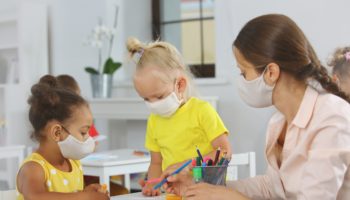Sarah Brendle, guest blogger
My name is Sarah Brendle. I have 3 children ages 11, 17, and 19. Below is an interview with my daughter, Phoebe. I asked her a few questions about how living during the pandemic of COVID-19 has affected her. Phoebe currently attends our public middle school in-person. She is in 6th grade.
Sarah: Last year in 5th grade you began the year fully virtual. What was that like?
Phoebe: Virtual was frustrating. There were a lot of technical issues. Other kids weren’t commenting or answering. I feel like I didn’t learn very much.
Sarah: What was the worst part of being virtual?
Phoebe: It was annoying not seeing my friends.
Sarah: Partway through last year you began going hybrid (2 days per week). How was that?
Phoebe: Kids didn’t wear their masks right. Teachers were constantly telling them, “Pull your mask up” and “Put your mask back on”.
Sarah: Were you nervous to be around more people at school after what you heard about COVID?
Phoebe: I don’t worry about it too much. I don’t mind wearing my mask and I know to wash my hands. But when I don’t feel 100%, like if I have a runny nose or cough a few times, I get a little worried.
Sarah: What do you do when you don’t feel 100%?
Phoebe: I tell you.
Sarah: This year you are in school full time. What is that like?
Phoebe: The teachers are more used to everything now. We have assigned seats and we don’t get to do much partner work, but I like it much better than virtual.
Sarah: How about other kids and their masks this year?
Phoebe: Most of them accept them. Sometimes in the beginning (of masks being required) a few people had to be reminded to wear it, but it has improved.
Sarah: You mentioned assigned seats. Is that just in the classrooms?
Phoebe: It’s everywhere. On the bus, in classrooms, the cafeteria. I was upset the first day in the cafeteria because I didn’t know I was going to have to stay in the first seat I picked, and I didn’t have any friends near me. But now I have a new friend at lunch that I talk to.
Sarah: Do you know why you have assigned seats?
Phoebe: So they can do contact tracing.
Sarah: Do other kids or your friends ever talk about COVID?
Phoebe: Most kids don’t talk about it. If anyone says anything it’s usually something short. We would rather have fun.
Sarah: During the third week of school, I was told that you were placed in the incorrect math class for your ability level. Part of the reason this wasn’t realized earlier in the year, is one of the teachers that helps with scheduling was out of school for a week because she had COVID. The school gave you the option to change classes. What did you think about all this?
Phoebe: Well, if someone would have known sooner it would have helped. When I started the new math class, I was really confused. My friends tried to help me, but it was hard. The teacher didn’t have a lot of time to work with me, so I got upset sometimes when I couldn’t do my homework.
Sarah: We’re going to see your brother at college soon. To go to the football game there, you need to get a COVID test (since she can’t yet be vaccinated). Are you okay with that?
Phoebe: I know why I need to get it, but I’m worried about them sticking something up my nose. But I want to go see him, so I know I need to do it. But I don’t think I have COVID.
Sarah: How has your world changed because of the pandemic?
Phoebe: For me, I go out less. Like, we don’t go many places and especially last year we saw people less. That was boring. But I think it’s different in every family. On my end, I understand what’s going on, so I’m able to understand why.
It was interesting to hear Phoebe’s point of view on living during the pandemic. Many of her answers were what you would expect from a younger person. As a mom, though, I was proud that she seems to understand what’s happening (at least in her immediate world). Although she has a little anxiety at times, she knows she can come to me or her dad, or her friends, and be reassured. This is not the case for all children, as some are very fearful of what would happen if they or a loved one was diagnosed with COVID. Pay attention to the students in your class to see if you notice any extra aggression, frustration, or if they’re not participating as much. They may need a gentle reminder that we’re working through this together and they can talk to you or their parents if they get worried.




